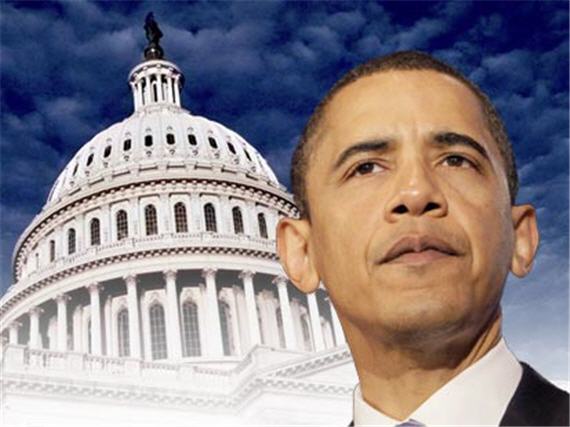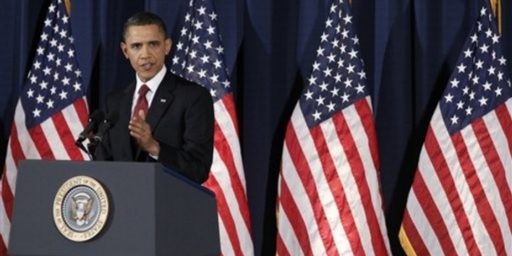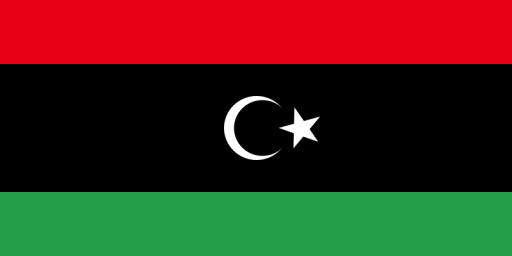Congress vs. Obama on Libya
The War Powers Act's 90 day limit is in sight. Will Congress force the president's hand?
James Jay Carafano believes a showdown between Congress and the Obama administration on Libya is nigh:
Under the Capitol dome, there is no apparent consensus on the wisdom of the Libya adventure. But, more and more lawmakers seem to coming to the opinion that the president’s Libyan “strategy” is little more than hope—and they don’t like it.
The Oval Office hopes that Gaddafi trips over a bunker-busting bomb or that Turkey can somehow broker a deal that gives the Libyan leader an exit strategy. If that happens, the president will take credit for a regime change wrought by “leading from behind.”
He’ll also use the win to denigrate the push-back from the Congress—particularly from conservatives (even though members of both parties are chafing about the president’s war strategy. If hope pans out, it will be a win-win for the White House.
The problem for the president is that Gaddafi can read a calendar. In about two weeks, the deadline for the withdrawal of troops under the War Powers Resolution (WPR) will be up.
If he is still standing then, those unhappy with the president’s refusal to explain his rationale and military strategy (even those who know the WPR’s withdrawal provision is unconstitutional and don’t want to abandon NATO allies on the battlefield) may vote with the isolationists and War Power zealots to express their displeasure.
The resolution offered by Rep. Dennis Kucinich, D-OH, will easily pass in the House, and pressure for a similar vote in the Senate will be overwhelming. NATO allies will start to get really nervous about American commitment.
Gaddafi knows if he can hold out a few more weeks, he may be able to break NATO’s resolve or at least cut a better deal for the price of leaving the country.
Obama’s strategy makes sense only if the enemy in Libya does exactly what he wants. Enemies rarely are so accommodating–when they have options.
Gaddafi seems to still have options. The smart money is he can’t hang on forever–but he can hang on for two more weeks.
If the president’s relationship with Congress melts down over Libya, he will have no one but himself to blame. Congressional leaders in both parties don’t want to pick a fight with him over Libya, nor do they want the president to fail (even those who were not crazy about going in to begin with).
The better bet for Obama would be engage with the Congress now, agree on a way forward in Libya, and then ask Congress to endorse it. At least, that is how many on the Hill see it.
I opposed the Libyan intervention from the outset and have believed from the beginning that the “hope Gaddafi somehow falls” strategy was problematic. And it’s not unreasonable to suspect that even a large number of Democrats on the Hill agree with that assessment.
But it’s almost inconceivable that Congress will do anything about it. The War Powers Act is likely unconstitutional and the courts have shied away from trying to enforce what they consider a political question, so the 90 day limit isn’t going to do the work by its lonesome.
Will the House, which is controlled by Republicans who see beating Obama pass Kucinich’s bill? Well, maybe. But it’s awfully risky. If Gaddafi falls amidst the pressure, Obama will get credit for it, deserved or not, with the American public.
How about the Senate? Not a chance. The Democrats have a slim majority and are unlikely to want to embarrass their president. Beyond that, there are some neonconservative Republicans, John McCain most notable among them, whose chief complaint is that Obama hasn’t been aggressive enough. It’s a safe bet that there are at least 40 Senators who would steadfastly oppose any measure on this.
The Framers were banking that institutional jealousy would fuel checks and balances, overcoming factional loyalty. And there are some Members, especially in the Senate, who will defend the perquisites, power, and deference owed to their institution. But presidents have long had the whip hand on war policy and Congress has generally not had the spine or consensus to fight back.







Well, that is, of course, your opinion. Given that the law has been on the books for over 30 years and has not been struck down, I think it is fair to say that it is NOT unconstitutional today, and is likely NOT to ever be found to be unconstitutional by the SC in the future.
I agree that the resolution probably is going nowhere. But it always unwise to bet against the GOP going all in to embarrass or defeat this president, the consequences for the nation be damned.
No, Congress won’t do anything.
The Prime Directive for Congressmen is “get re-elected”. Presidential action especially in the context of a War Powers Act (whether it’s constitutional or not) gives them plausible deniability.
@Tano:
Setting aside the question of whether it is unconstitutional or not, the fact of the matter is that the only way to find out is for the law to go before the Supreme Court. I have long thought that neither side (the Congress in particular) is really interested in finding out. As such, it becomes an issue that creates a lot of posturing with unlikely resolution (and in a way that tends to favor executive power).
I would expect that pattern to continue.
Whether or not the congress forces a US withdraw may be a moot point, given that everyone else may be going home soon:
Norway decides to withdraw fighter jets from Libya operation by August
What happens if the US gets left to take care of Libya essentially by itself?
If the WPA is unconstitutional then the President doesn’t’ have the authority under the Constitution to act in way of war for the 60 days without Congress approval in the first place.
That said precedence goes a long way in what power the branches have. So I predict the WPA would be found constitutional. If Congress doesn’t act then more power will go to the Executive branch. Future Presidents can point to this case as giving them the authority for similar actions. Wither that is good or bad is matter of opinion. IMO like most things it would be a mix bag but I can see it being abused. I don’t see why Obama didn’t and doesn’t go to Congress to get their approval.
I think the courts have already given their answer in response to the Kosovo lawsuit — they won’t take the case. With one said believing the WPR is Constitutional and the other believing it’s not, without a neutral arbiter, there is no check on the executive other than politics.
that is the main thing i cannot get my head around. even given the resolute opposition in the house, i cant see them denying authorization. did they really believe it would be a one and done operation?
The Obama administration seems to have this weird blindness that they always seem shocked that anybody disagrees with them and that it might be necessary to build support before taking a major action. Even in cases where that support would likely be easy to get, they never bother and then end up in situations like this.
I think that’s a very astute remark, Stormy. I’ve got a post up at my place in which I note that I genuinely cannot understand why President Obama doesn’t sell his policies to the country as much as he might. Your comment ties in with that nicely.
I honestly don’t know if it’s blindness (as you suggest), the technocratic impulse (leave it up to the experts and don’t bother your pretty little heads about it), that the rightness of the policy decisions are so obvious to them they can’t believe anyone could possibly disagree for other than partisan reasons, or something else.
how much of this is due to the perception that americans simply dont care all that much about foreign policy, especially in the midst of a stumbling economy? if i were a congressman, and i werent hearing all that much about it from my constituents, would i be in a rush to go out of my way to rebuke my party leader? or is that just a misperception on my part.
The reason I use the word blindness is that there also seems to be a habit of doing things (things that in and of themselves aren’t a problem) in a way that almost seem designed to unnecessarily iritate people or to provoke opposition. I get the idea that the President really doesn’t see the way things he does are going to come across after the fact.
For example, the first lady showing up somewhere in an expensive designer dress. Again, while there’s nothing wrong with her buying that and in a perfect world that should pass without comment, most people would realize that in the current economy, it’s probably not the most effective political strategy to be seen living lavishly.